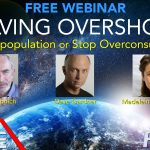
Reduce Immigration and Go Vegan?
Here’s the 7th and final installment of questions from our Solving Overshoot webinar. I’m sharing the questions we didn’t have time to address, and I’m including comments received from Madeleine Somerville and Paul Ehrlich, our panelists. If you missed the first few installments, start here with installment one. Your comments are welcome below. I’ve jumped in and offered some of my own thoughts because of the importance and relevance of these. I look forward to reading your thoughts.
24. Libby Sharpe asked: “I hate to be the one to raise the immigration question, but any thoughts about that? I am compassionate toward immigrants, but it seems to me that unfettered immigration just disseminates populations without lowering birthrates, as much of the immigrations is from countries where there is high selective pressure for increased birth rates.”
Paul Ehrlich: May actually increase consumption, but ethically-charged and difficult issue (for some of the issues see the ancient Ehrlich PR, Bilderback L, Ehrlich AH. 1981. The Golden Door: International Migration, Mexico, and the United States. Wideview Books.)
Madeleine Somerville: I support immigration especially in refugee situations, and I suppose one could argue that moving to a place with broader support for contraception, abortion, and cultural preference for smaller families may impact birth rates among immigrants.
Dave Gardner: In some respects the (over)developed world has created the conditions that lead to mass immigration. We don’t have much right to turn away people whose resources we’ve appropriated or people whose land is underwater thanks to the climate disruption we’ve caused. We owe them safe passage. In other cases, it doesn’t seem so wise or even compassionate to entice people to give up their homes and more sustainable cultures in order to join our colony of addicts. We are addicted to excess and are going to have to go through the pain of (and joy) of going cold turkey and getting unhooked. Why sign more people up for that challenging path? I also see nations using immigration to grow their economy, because their metrics for success and progress are so screwed up; I’d like to see that exploitation of immigrants end. It may be impossible to get rational population policies in a world where countries don’t have to take any responsibility for the sustainability of their footprint. All that said, I don’t see lowering immigration to (over)developed nations as our highest priority, especially since focusing on that closes a lot of doors right now. I’d rather keep the doors open while we bring the world up to speed on overshoot and what is needed to get out of this condition.
25. Grant Barnes asked: “Thoughts on veganism to reduce consumption?”
Paul Ehrlich: Eating less meat certainly a good idea, veganism less so.
Madeleine Somerville: I’ve been a vegetarian for over 10 years and do believe in the environmental benefits of a plant-based or meat/dairy reduced diet.
Dave Gardner: That’s one tool in the toolkit of reducing our footprint. I just think we should be clear that it is not a panacea that would make 7 billion (or 11) suddenly sustainable.
26. Chris Bystroff asked: “How do people feel about a face to face conference on overshoot?”
Dave Gardner: I think we did discuss this briefly, but it warrants further conversation here. It’s expensive and fraught with challenges, but I still love the idea and would support any effort.
27. James MacDermott asked: “Do the webinars successfully educate people who don’t already know about overpopulation? How can GrowthBusters attract a larger audience?”
Paul Ehrlich: Probably not, and, sadly, don’t know.
Madeleine Somerville: The core audience of these webinars will likely be comprised of those already interested in the issue, but as you attract different panelist and involve different interest groups (e.g. those campaigning for women’s rights, water rights, minimalists, zero-wasters, etc.) you’ll rope in different groups and grow your message.
Dave Gardner: That’s a great question, James. We’ll discuss that at our January online meetings (registration currently open only to GrowthBusters members due to attendance limits). I want to find a way for the webinar series to serve both the newly curious and the long-time activists. It may be we need two different tracks – like an undergraduate course and a post-graduate course at a university. Suggestions welcome.
Those were the last of the unanswered questions from our Solving Overshoot webinar. If you missed that webinar, a replay is available to GrowthBusters members. The next webinar will be in February. Thank you for your interest.
Are you inspired to become a GrowthBuster?
Tags: overconsumption, overpopulation, overshoot, population growth, sustainability, webinars
Trackback from your site.





Brian Sanderson
| #
First, population growth is a cultural phenomenon. People who have pathological cultures have no incentive to change their culture so long as someone else carries the can for them.
Migration should be unrestricted between nations that have reduced fertility below replacement. Such nations should strictly exclude migrants from high fertility nations — but offer high-fertility nations free and abundant contraception.
You would be amazed how quickly cultures would change.
First, ethics must be grounded in reason — emotional thinking is vastly overrated. Continued population growth is:
(1) The cause of aggressive war
(2) The cause of systemic terrorism
(3) The cause of poverty
(4) The cause of environmental destruction, the extirpation of species, the wholesale rearrangement of ecosytems,
(5) The cause of diminished freedom
Such things are unethical ion my view. Those who push population growth (like Erdogan and his supporters or the Pope and his supporters and oh so many more) are freedom-sapping war-mongers and poverty-pushers pure and simple.
Reply
knowmad
| #
“If everyone agreed to become vegetarian, leaving little or nothing for livestock, the present 1.4 billion hectares of arable land (3.5 billion acres) would support about 10 billion people,” Wilson wrote.
The 3.5 billion acres would produce approximately 2 billion tons of grains annually, he explained. That’s enough to feed 10 billion vegetarians, but would only feed 2.5 billion U.S. omnivores, because so much vegetation is dedicated to livestock and poultry in the United States.
http://www.livescience.com/16493-people-planet-earth-support.html
Reply
Dave Gardner
| #
No doubt there would be an improvement in the food supply. Would it support 10 billion people without requiring continued use of artificial fertilizers, depletion of fertile soils and aquifers, and the world’s supply of phosphorous? Would we suddenly stop burning coal and oil? Would climate change no longer be an issue? Would fresh water crises disappear? Would species extinction slow back down to a natural level? Would depletion of other non-renewable resources suddenly stop? Not a bad idea, but not a panacea.
Reply
Grant
| #
Thanks, Dave, I just saw this (it would be more visible to me on fb).
Note that it’s important to focus on veganism rather than “vegetarianism.” One reason is that the latter has no consistent or morally coherent definition.
We agree that veganism is not a panacea. The salient point is its accessibility. The world could probably go vegan today with minimal effort by comparison to that required by most other anti-growth wedges. Going vegan could hardly be easier or simpler, and has many additional incentives, including being the only way of interacting with nonhumans congruent with the traditional values of many cultures, including the West (which is relevant in this conversation because many or most of its participants are Westerners).
No well-known organization currently promotes a consistent vegan message in the West. I am interested in what could be achieved if one did.
I weigh this against promoting antinatalism and opposing growth in other ways.
Which do you think is likely to have a better “ROI”?
Reply
Robert Bériault
| #
With a little bit of imagination, this new vegetarian society could devise ways of housing people in chicken cages, and the planet could hold a hundred billion people. But what would be the point of living? I like a good roast beef.
Reply
Grant Barnes
| #
Robert, do you think nonhuman animals should die unnecessarily?
Reply
Fons Jena
| #
Though I am pro vegetarian/vegan I totally agree with this. We keep on talking about reducing our individual footprints so that humanity remains ‘sustainable’. But what a future is that?! I don’t want to reduce my consumption because some people think ‘more people means more fun’. No, I refuse. I won’t let other people tell me that I can’t drive a car without feeling guilty. I don’t want to be stacked in ‘eco’ appartements eating industrial ‘eco’ food. We can reduce our existance to a cave man in order to be a sustainable civilization. I ride a bike instead of a car and eat vegatarian because it is ‘morally good’, not because I must do it in order to fuel population growth or to reduce my ‘footprint’.
Simple choice we have here if we want to be sustainable: less people with a higher quality of life or more people with a lower quality of life. I choose the first option. I have no kids so I’m more ‘sustainable’ than the hardcore vegan who lives in a cave but still has a kid walking around.
Reply
Dave Gardner
| #
Thank you, Fons Jena and Robert Beriault, for very valid points. Grant, I wouldn’t be surprised if people are more likely to adopt a smaller family norm than go vegan. I just don’t know. What I do know is I’m not putting all my (free range) eggs in one basket!
Reply
Sailesh Rao
| #
Imagine a weight-lifter who is lifting 5 times his weight above his head, discovers that he is on quicksand and that he is sinking. Knowing that his weight alone is too much for the quicksand to bear, what is the first thing that he should do?
Drop the weight!
The biomass of human beings today is 500 MT, which is 2.5 times the estimated biomass of all wild megafauna from 10K years ago (see Barnosky, PNAS 2008). Our biomass alone is too much for the planet to sustain on a long-term basis. In addition, we are currently procuring FIVE times as much food for our livestock than we eat ourselves. Knowing that we are on ecological quicksand, the first thing we should do must be to drop that weight!
This is precisely VEGANISM.
This is why Veganism is a rational, moral foundation for any sustainable civilization that we can devise, whether on Mars or on Earth.
Reply